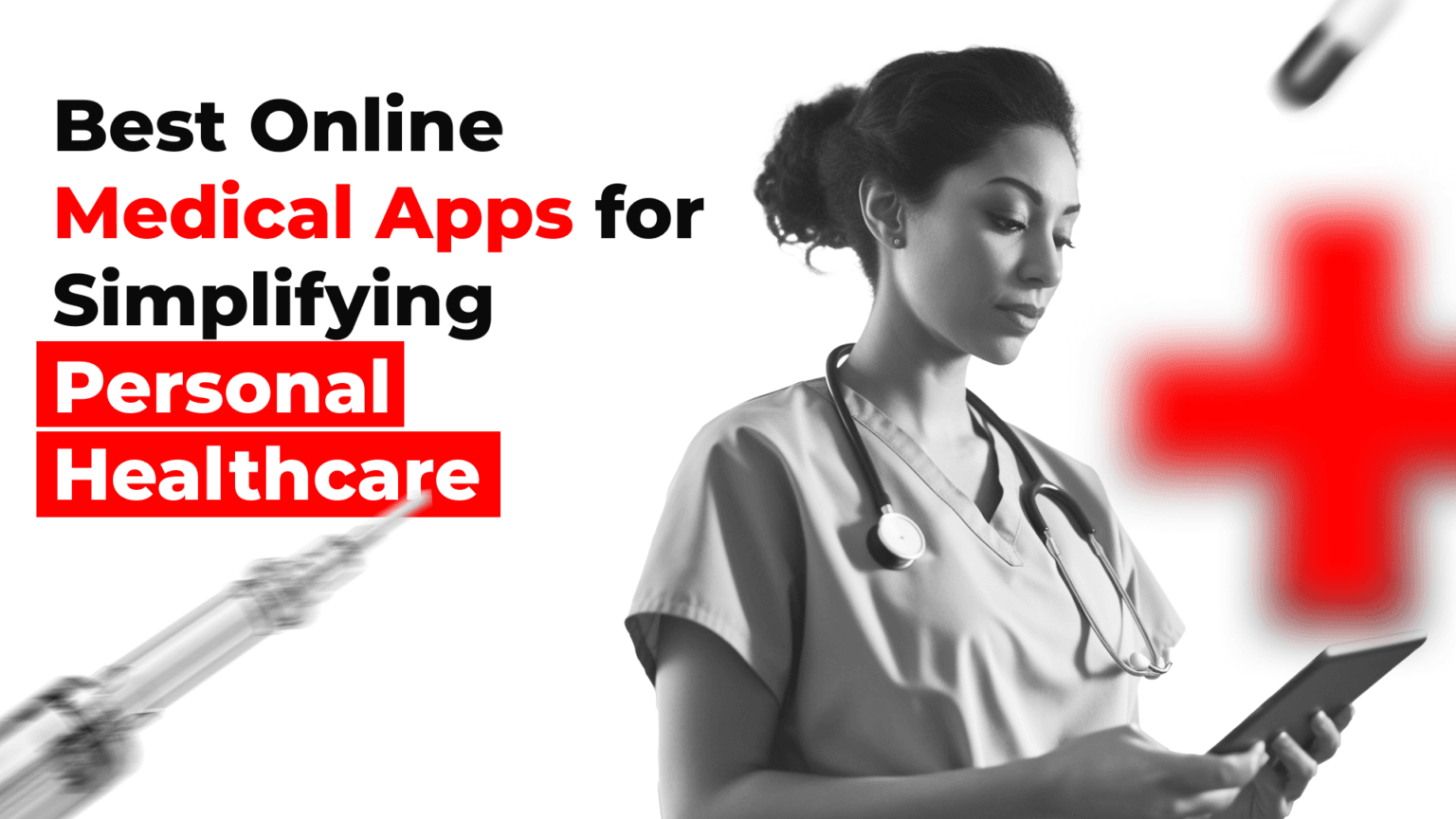Do you use your phone to set up reminders to take your prescription drugs? To enhance your health, keep track of your physical activities. Have you ever had a video chat with a doctor to discuss an urgent medical issue? An app exists for that.
The numbers also speak facts. The stats convey that the market for mobile health (mHealth) apps was previously expected to be worth $8 billion in 2018. This number is now expected to reach $111.1 billion by 2025. This shows that the advent of every new app being released, it is claiming to improve the efficiency of the management of mental stress along with physical health. But the question is do they really help or work as per their commitments?
We went over our best choices for personal and medical health applications that are worth the time and space on your smartphone.
Benefits of Using Online Medical Apps
No matter who you are, whether a patient or a physician, getting the right access to the best mobile health apps can offer you numerous advantages. Some of the benefits are:
Let’s examine these advantages in more detail;
1. Enhanced Involvement of Patients
Quality treatment is more crucial than ever in the patient-centered environment of today. Through efficient patient-focused treatment, individualized experiences, and information exchange between patients and providers, mHealth apps promote engagement. Rather than taking long trips to hospitals, patients can now conveniently access, monitor, and get their prescription information. Moreover, they can get their previous medical records from the comfort of their own homes.
2. Reduce the Chance of a Misdiagnosis
There’s no doubt that manual training of patient data often takes a lot of time. Moreover, it can also be much prone to diagnostic errors and inaccuracies. However, the health applications eliminate all such possible difficulties that could endanger the patient’s life. It also aids in accurately storing in the app a computerized report of the patient’s health status. This helps physicians prescribe the appropriate medication with the right chemical makeup and dosage. This information can be readily collected to enable prompt medical decisions in cases where a patient switches between healthcare providers.
3. Instant Care Accessible Anytime, Anywhere!
Patients can easily and securely send messages, arrange appointments, and connect with care providers around the clock for telemedicine visits with mobile health apps, in contrast to the ineffective traditional telephone connection to doctors and healthcare organizations. In order to eliminate offline visits for minor concerns, patients can ask their inquiries via video calls, chats, or phone calls. As a result, the process is extremely efficient.
4. Easy Payment Processes
In the past, paying bills was a difficult task for both patients and hospital employees. People no longer have to spend hours standing in line to pay thanks to mobile healthcare apps. With only a few clicks, users can securely make immediate purchases thanks to the app’s highly secure payment gateway connection. Additionally, they can use applications to connect to their insurer (if necessary), choose their preferred payment method, and make payments online using a credit or debit card.
5. Better Alerts for Prescriptions
There are several types of health applications today that now allow users to set up electronic reminders that will remind them of many aspects. These include prescription renewals, impending doctor’s appointments, and any other important information. This makes it easy for patients as now there is no need to worry about being unable to attend therapy sessions. For the patients, this now offers them far more control over their treatment. With automatic reminders, patients have a better experience and a significant portion of repetitive and tiresome administrative work is eliminated.
6. Improved Data Administration
Every day, healthcare organizations handle enormous amounts of personal data. Therefore, it must be appropriately organized. Healthcare apps that are integrated with EHR automatically capture important patient data from wearables or other connected devices. This helps healthcare professionals to comply with HIPAA and build a thorough profile of every patient.
7. Improving Medical Settings Using IoT Applications
Applications for IoT-connected healthcare, such as wearables like fitness bands and other wirelessly connected gadgets like glucometers and blood pressure and heart rate monitors, provide real-time monitoring that lets physicians get precise medical information about their patients at any time or location. Additionally, devices such as electrocardiograms, thermometers, and ultrasounds are beginning to connect and enable medical professionals and patients to monitor health. Doctors can provide outstanding care and make well-informed judgments thanks to the data gathered by IoT healthcare equipment.
Top 20 Best Online Medical Apps in 2026
Online medical applications offer easy access to physicians, prescription drugs, and health monitoring in response to the rising demand for digital healthcare. The top medical apps available online in 2026 are listed here, along with information about their main attributes, costs, platform accessibility, and advantages and disadvantages.
1. Doctor On Demand
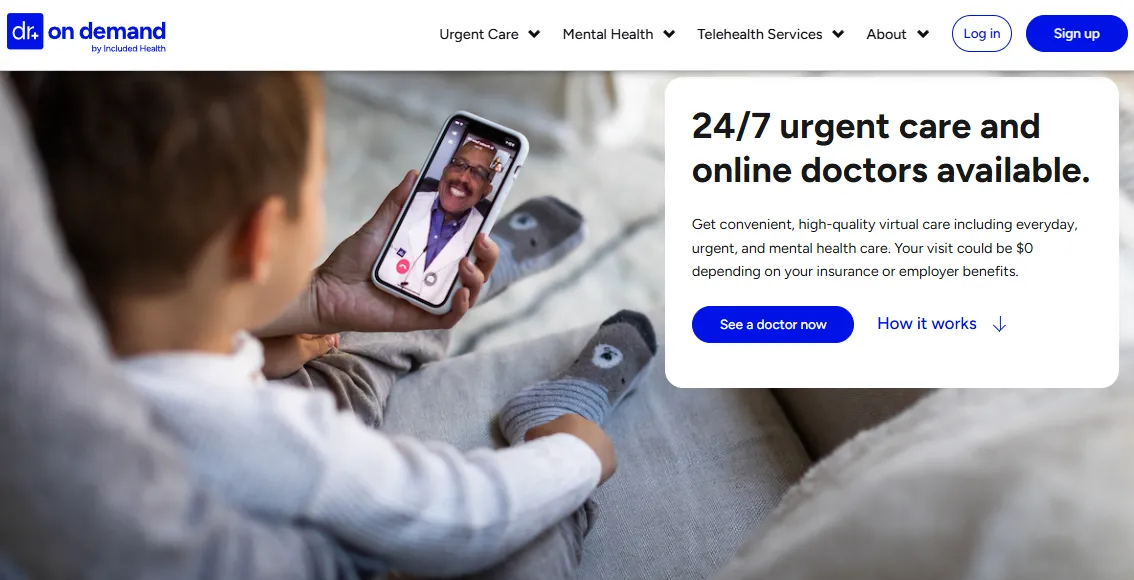
The first in our list of the best mental apps is Doctor On Demand. The app is popular as it can connect the users with board-certified doctors, psychologists, and psychiatrists for getting the best virtual consultations. The app covers a lot of features starting from urgent care, mental health, preventive care, chronic condition management, and more. With this app, now patients can receive accurate prescriptions, lab tests, and referrals by just sitting comfortably in their homes. The platform can now ensure high-quality care with licensed professionals and is available 24/7.
- Pricing: Pay-per-visit, starting at $79 for general consultations
- Rating: 4.8/5
- Platform Availability: iOS, Android, Web
| Pros | Cons |
| 24/7 access to doctors | No in-person visits are available |
| Covers urgent and mental health care | Insurance required for lower costs |
| Prescription and lab test referrals | Limited availability for specialists |
| Easy-to-use interface | No free consultations |
| Video calls with certified doctors | Some services may be expensive |
2. Talkspace

Talkspace is one of the prominent online therapy apps! This app can now connect users with licensed therapists for mental health support. Users can also offer text, audio, and video-based therapy sessions which are specially personalized for the needs of every individual and their mental health.
- Pricing: Starts at $69 per week for therapy plans
- Rating: 4.6/5
- Platform Availability: iOS, Android, Web
| Pros | Cons |
| Unlimited text therapy options | No immediate live sessions |
| Licensed therapists available | Subscription-based pricing |
| Covers multiple mental health conditions | Insurance coverage varies |
| Private and secure messaging | Some users prefer in-person therapy |
| Convenient scheduling | Higher cost than traditional therapy |
3. PlushCare
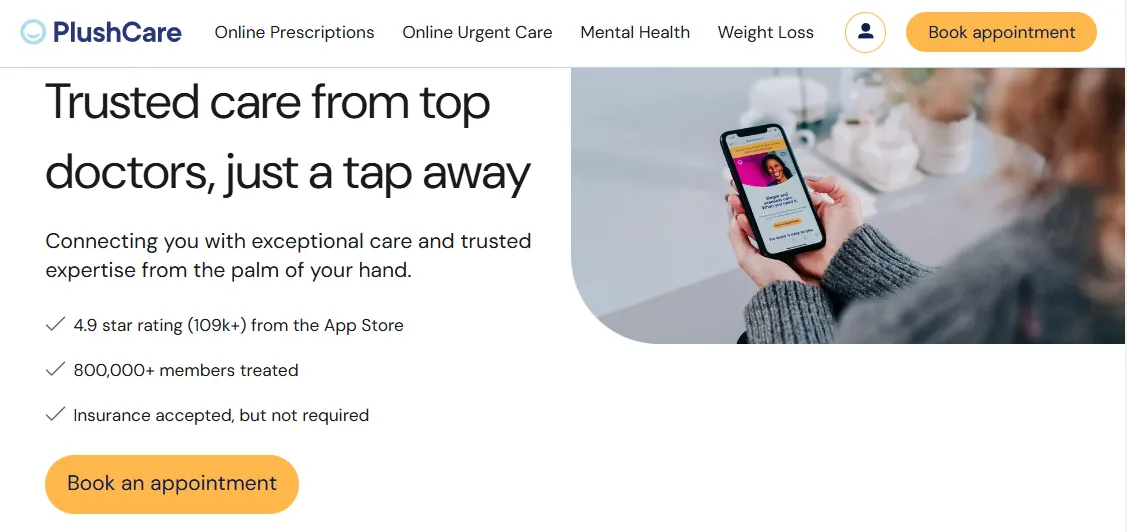
PlushCare is another top app which now offers virtual doctor visits with top U.S. physicians. Get the right treatment options for primary care, urgent care, and mental health treatment. The app now lets the users can book same-day appointments and receive prescriptions online. The app integrates with insurance for affordable consultations.
- Pricing: $99 per visit (or lower with insurance)
- Rating: 4.7/5
- Platform Availability: iOS, Android, Web
| Pros | Cons |
| Same-day doctor appointments | Requires internet connection |
| Accepts most insurance plans | Membership required for best pricing |
| Covers primary and urgent care | Not available in all states |
| Prescription and refill options | Limited free features |
| Easy-to-use booking system | No in-person care is available |
4. Ada – Health Companion

Ada is an AI-powered symptom checker that provides personalized health assessments. Users input symptoms, and the app offers insights and potential conditions. It’s designed to support preliminary diagnosis and guide users on seeking medical care.
| Pros | Cons |
| AI-driven symptom analysis | Not a replacement for doctors |
| Free to use | May misinterpret complex symptoms |
| Provides health recommendations | No real-time doctor access |
| Supports multiple languages | Requires internet access |
| User-friendly interface | Limited follow-up support |
5. PillPack by Amazon Pharmacy
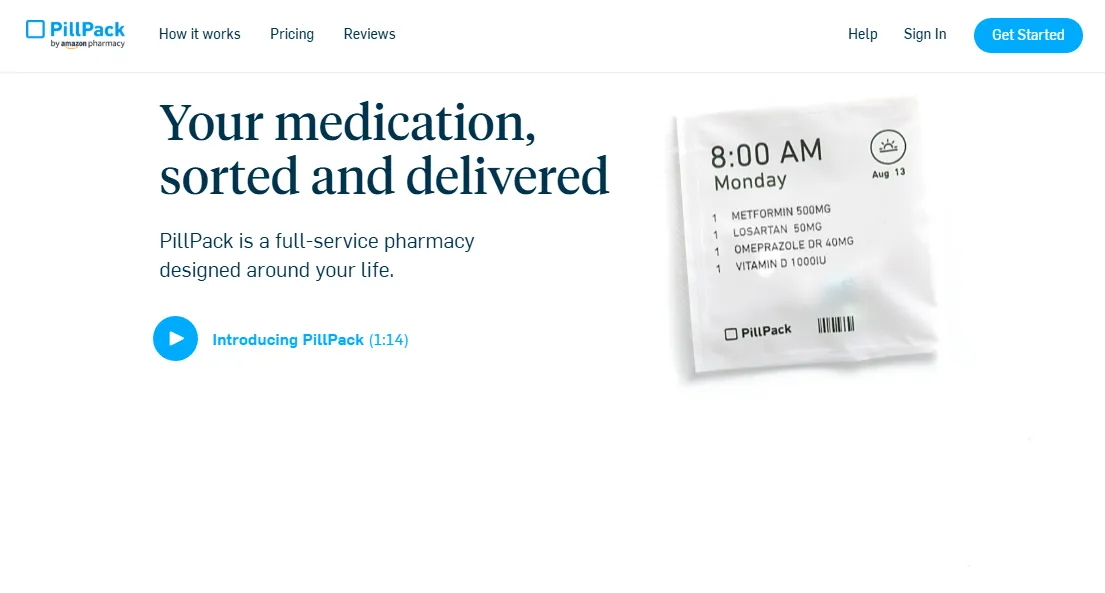
PillPack is another app that can easily simplify medication management. The app can now deliver pre-sorted prescriptions in individual packets. The service is ideal for individuals with multiple prescriptions.
- Pricing: Varies based on insurance and prescriptions
- Rating: 4.6/5
- Platform Availability: iOS, Android, Web
| Pros | Cons |
| Presorted medication packets | Requires prescription verification |
| Home delivery available | Limited availability outside the U.S. |
| Auto-refill options | Delays possible in deliveries |
| Accepts most insurance plans | Not suitable for one-time prescriptions |
| Medication reminders included | Customer support response varies |
6. MyChart
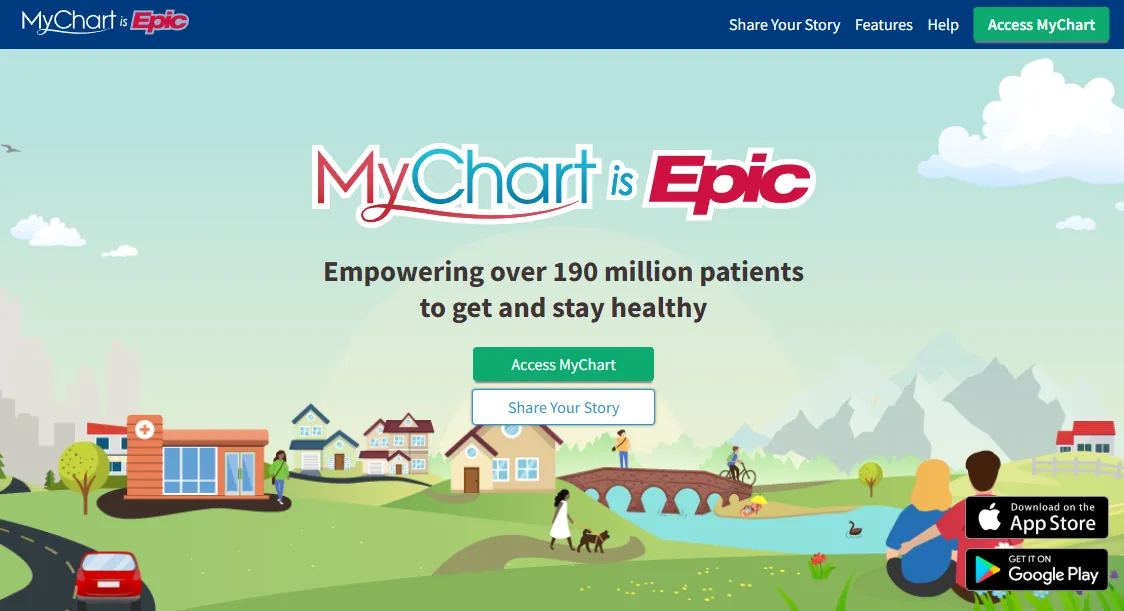
MyChart is a top app that can now offer access to numerous data points. These include personal health records, appointment scheduling, lab results, and prescription management. Moreover, it can also connect users with healthcare providers and allows secure communication.
- Pricing: Free (integrated with healthcare providers)
- Rating: 4.4/5
- Platform Availability: iOS, Android, Web
| Pros | Cons |
| Secure medical record access | Requires provider participation |
| Appointment scheduling included | Limited features without provider access |
| Lab results and prescriptions | Some features require login verification |
| Messaging with healthcare providers | Can be complex for new users |
| Free for patients | Not all hospitals support it |
7. WebMD

WebMD provides trusted medical information, symptom checkers, and health resources. Users can research conditions, medications, and treatments. The app will also offer you a directory of top doctors along with the feature of timely medication reminders.
| Pros | Cons |
| Extensive medical database | Not a substitute for doctors |
| Free symptom checker | Can cause unnecessary anxiety |
| Health and wellness tips | Ads can be intrusive |
| Includes medication reminders | Requires an internet connection |
| Doctor directory included | No real-time consultation |
8. SnoreLab
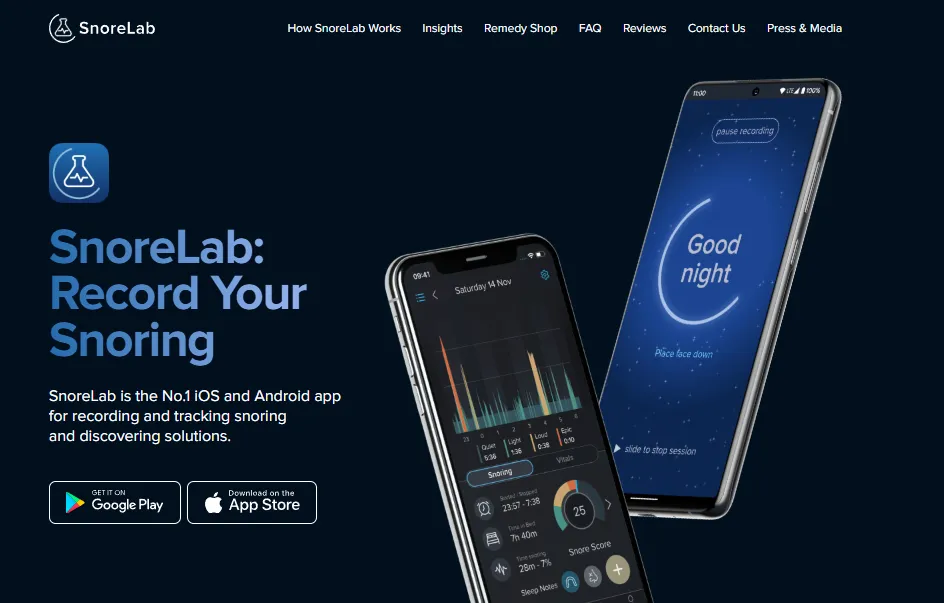
SnoreLab helps users track and analyze their snoring patterns. It records sleep sounds and provides insights to improve sleep quality. The app offers personalized recommendations to reduce snoring.
| Pros | Cons |
| Records and analyzes snoring | No direct medical advice |
| Personalized recommendations | In-app purchases are required for full features |
| Tracks sleep quality | Limited without the premium version |
| Easy to use | Not a replacement for sleep studies |
| Provides lifestyle tips | Accuracy may vary |
9. MDLIVE
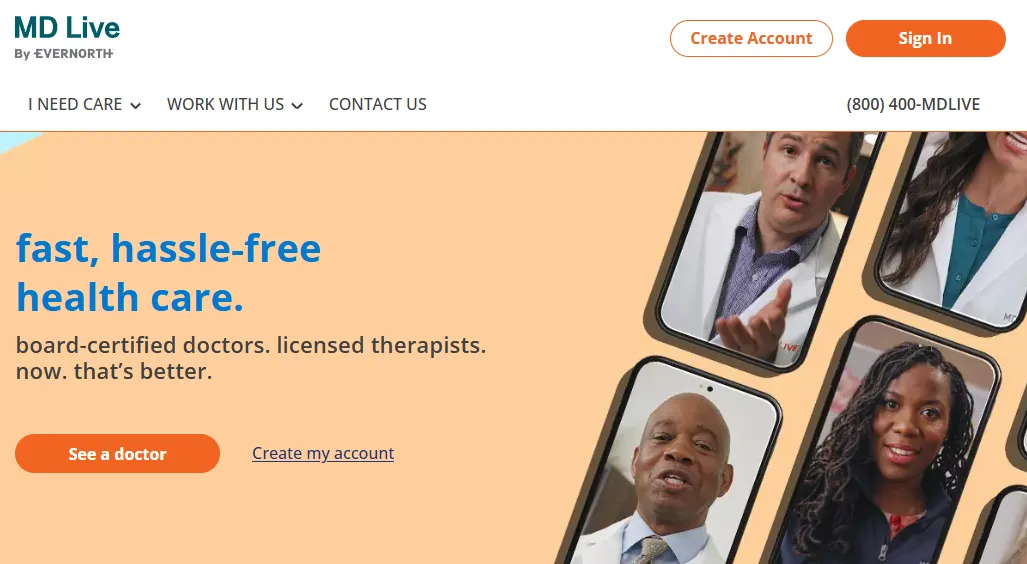
MDLIVE is one of the top listed apps that can offer virtual consultations. Now, the app is making connections with board-certified doctors, dermatologists, and therapists in a matter of minutes. The app is also making it easy for patients to seek appropriate treatments for common illnesses, chronic conditions, and mental health issues. Moreover, the app can support prescription services and lab test referrals.
- Pricing: The cost of the app starts at $75 for every visit
- Rating: 4.7/5
- Platform Availability: iOS, Android, Web
| Pros | Cons |
| 24/7 virtual doctor visits | No in-person consultations |
| Covers urgent care and therapy | Limited specialist options |
| Accepts insurance | Costs vary based on the provider |
| User-friendly app interface | Not all prescriptions are covered |
| Fast appointment scheduling | Some states have limited access |
10. BetterHelp

BetterHelp is another app that is also a leading online therapy platform. The app can easily connect users with the top licensed therapists. You can use modes like text, voice, and video calls. Additionally, with the app now you get the feature of confidential mental health support for stress, anxiety, and depression.
- Pricing: The cost of the app starts from weekly payments of $60
- Rating: 4.6/5
- Platform Availability: iOS, Android, Web
| Pros | Cons |
| Unlimited messaging therapy | No free trial available |
| Certified therapists available | Subscription-based pricing |
| Private and secure | Not suitable for crisis situations |
| Flexible communication options | No immediate live therapy |
| Covers multiple mental health conditions | No medication prescriptions |
11. Amwell

Amwell is a well-known name! The app now provides virtual medical consultations for any urgent care, therapy, and psychiatry. The platform can easily connect users with licensed professionals and also supports prescription refills and lab test referrals.
- Pricing: The cost of the app starts at $79 for every visit
- Rating: 4.5/5
- Platform Availability: iOS, Android, Web
| Pros | Cons |
| 24/7 doctor availability | No in-person care is available |
| Supports multiple health services | Insurance required for lower costs |
| Video consultations with professionals | Can be expensive per visit |
| Prescription and lab referrals | Limited appointment slots for specialists |
| HIPAA-compliant platform | No free consultation option |
12. Heal
Heal is a top name which now offers in-home doctor visits and telehealth consultations for any sort of primary and urgent care. This app can easily enable users to book visits in the same day and also get prescriptions from licensed and recommended physicians.
- Pricing: The cost of the app starts at $159 for self-payment but can also vary as per the insurance
- Rating: 4.4/5
- Platform Availability: iOS, Android, Web
| Pros | Cons |
| In-home doctor visits are available | Limited service areas |
| Accepts most insurance plans | Higher cost without insurance |
| Covers primary and urgent care | Appointments may take time |
| Prescription and referral options | Not available 24/7 |
| Easy booking system | No specialist consultations |
13. First Derm
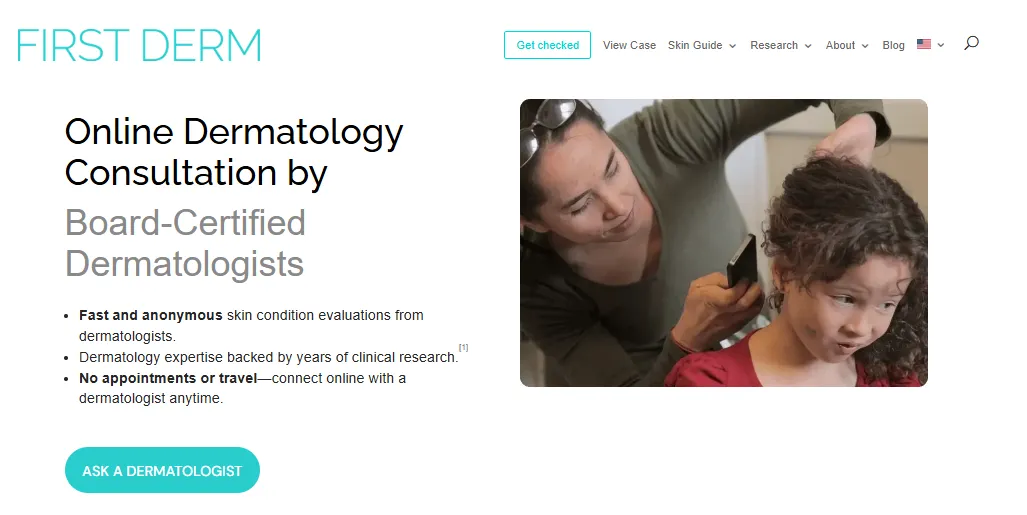
First Derm provides instant online dermatology consultations. Users can upload images of skin conditions and receive expert analysis from board-certified dermatologists within hours.
| Pros | Cons |
| Fast dermatology assessments | No live doctor calls |
| No appointment needed | Not covered by insurance |
| Secure and anonymous | No treatment prescriptions provided |
| Works for multiple skin conditions | Consultation fees can be high |
| Available 24/7 | No follow-up care included |
14. Maven
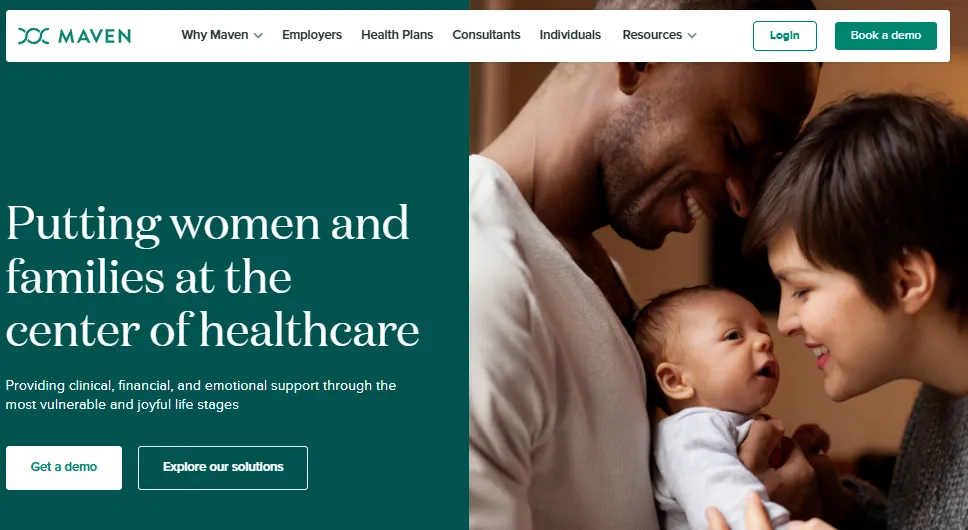
Maven is another digital health platform on our list! This is a top app that can specialize in women’s healthcare, maternity support, and fertility guidance. Today this app also offers visits with gynecologists, pediatricians, and mental health experts over virtual platforms.
- Pricing: The app offers membership plans that can range up to $20 per month
- Rating: 4.6/5
- Platform Availability: iOS, Android, Web
| Pros | Cons |
| Specialized in women’s healthcare | Not for general medical care |
| Covers pregnancy and fertility | Some services require additional fees |
| Mental health and pediatric care | Subscription required |
| Easy appointment booking | Limited availability outside the U.S. |
| Secure and private consultations | No emergency services |
15. ZocDoc

ZocDoc is one of the common names which is a top-notch appointment booking platform. The app can help users easily and quickly find and schedule in-person and virtual doctor visits. Moreover, the app provides doctor reviews, insurance filtering, and online check-ins.
- Pricing: The app is free to use but the fees for doctors can vary
- Rating: 4.7/5
- Platform Availability: iOS, Android, Web
| Pros | Cons |
| Easy doctor search and booking | No free consultations |
| Accepts most insurance plans | Limited availability in rural areas |
| Verified doctor reviews | Appointment times may vary |
| Covers multiple specialties | Requires internet access |
| User-friendly interface | No telehealth services included |
16. Teladoc Health
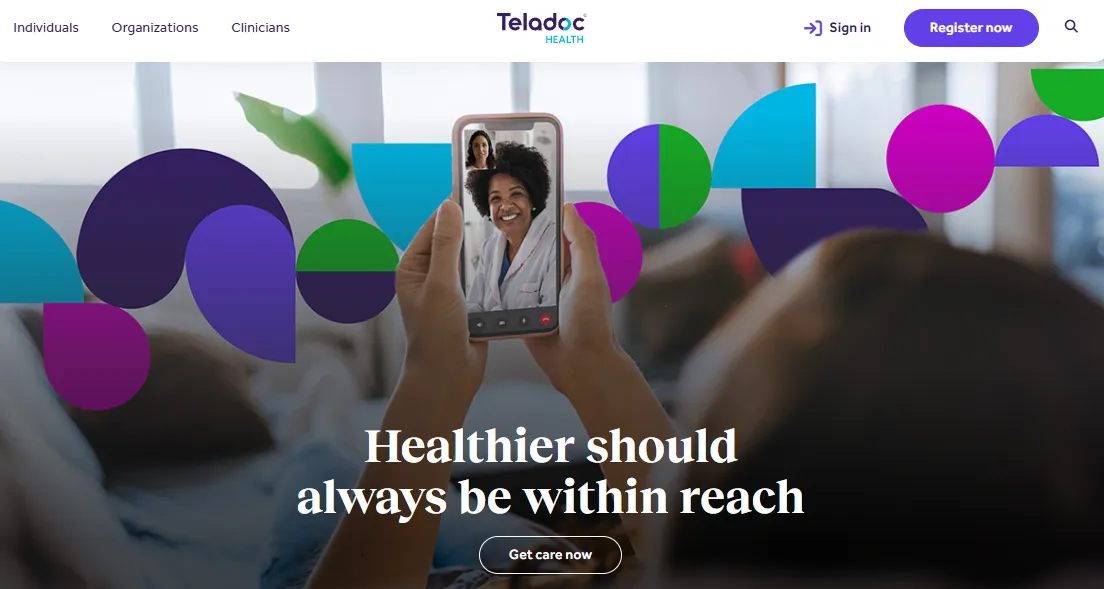
Teladoc Health is the top name that now provides virtual healthcare services. Now, get the right treatment for general medical conditions, mental health, dermatology, and chronic conditions. The best part? The app lets easy connection of users with doctors 24/7.
- Pricing: The cost of the app starts from $75 for every visit
- Rating: 4.7/5
- Platform Availability: iOS, Android, Web
| Pros | Cons |
| 24/7 virtual doctor access | No in-person visits |
| Covers multiple health conditions | Can be expensive without insurance |
| Accepts most insurance plans | Limited specialist availability |
| Prescription and lab referrals | No free trial available |
| Secure and private platform | Some services require a subscription |
17. GoodRx

GoodRx, one of the top medical apps now lets users find the best prices for prescription medication. The best part? The prices at the ones of local pharmacies. Moreover, it offers coupons and discount cards to lower medication costs.
- Pricing: The app is free but GoodRx Gold starts at the plan of $5.99/month
- Rating: 4.8/5
- Platform Availability: iOS, Android, Web
| Pros | Cons |
| Saves money on prescriptions | No doctor consultations |
| Works at most pharmacies | Discounts vary by location |
| No insurance required | Not all drugs are discounted |
| Easy-to-use search tool | Requires internet access |
| GoodRx Gold for extra savings | No health tracking features |
18. Medisafe
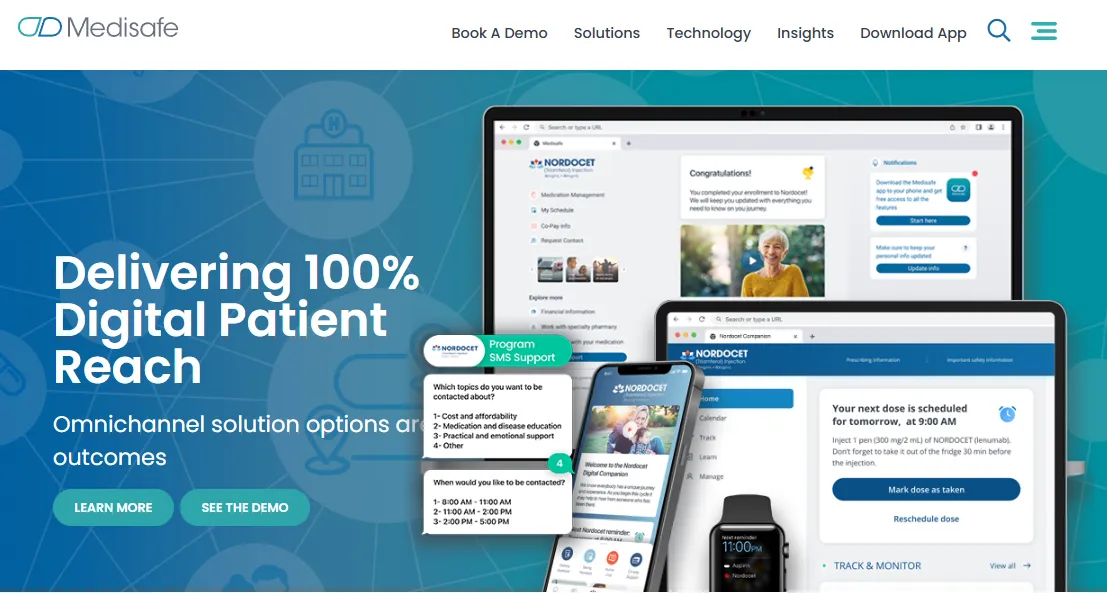
Medisafe is another top medication management app. This app can provide reminders, refill alerts, and health tracking. With this app, now every patient can adhere to the right treatment prescribed by doctors.
- Pricing: The app is free but there are in-app purchases
- Rating: 4.6/5
- Platform Availability: iOS, Android
| Pros | Cons |
| Medication reminders | No doctor consultations |
| Syncs with healthcare providers | Requires manual input |
| Easy-to-use interface | The free version has limited features |
| Health tracking available | No prescription discounts |
| Supports multiple medications | Internet required for backup |
19. Healow
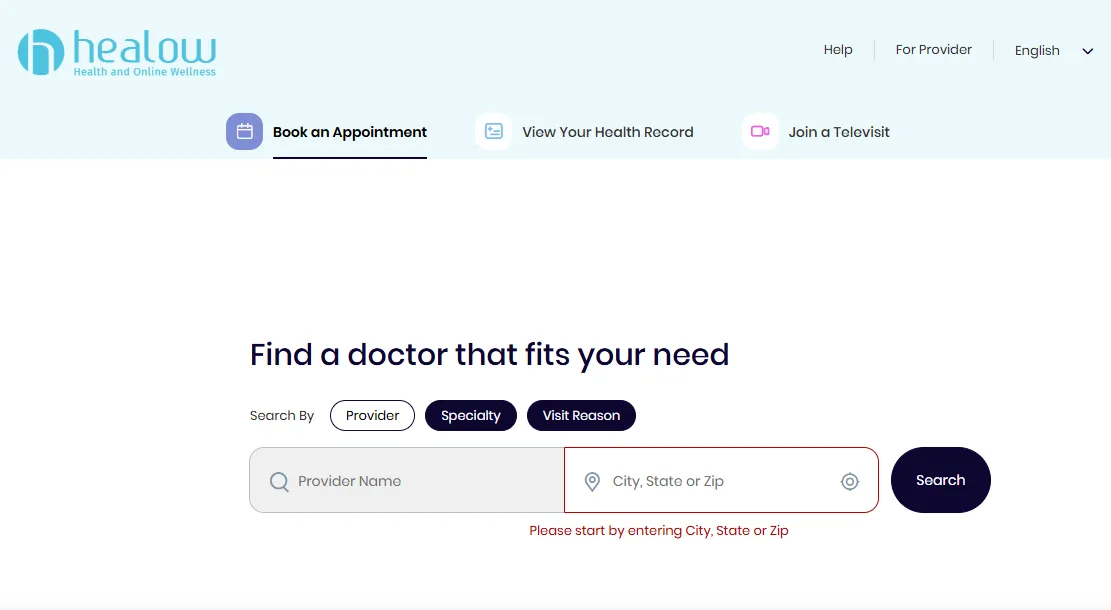
Healow is a top app that can connect the users with top healthcare providers. This can now help in appointment scheduling, medical record access, and prescription management.
| Pros | Cons |
| Access to health records | Limited to partnered providers |
| Easy appointment scheduling | No telehealth consultations |
| Secure patient portal | Can be complex for new users |
| Prescription tracking | Some features require provider access |
| User-friendly interface | No emergency services |
20. Fitbit
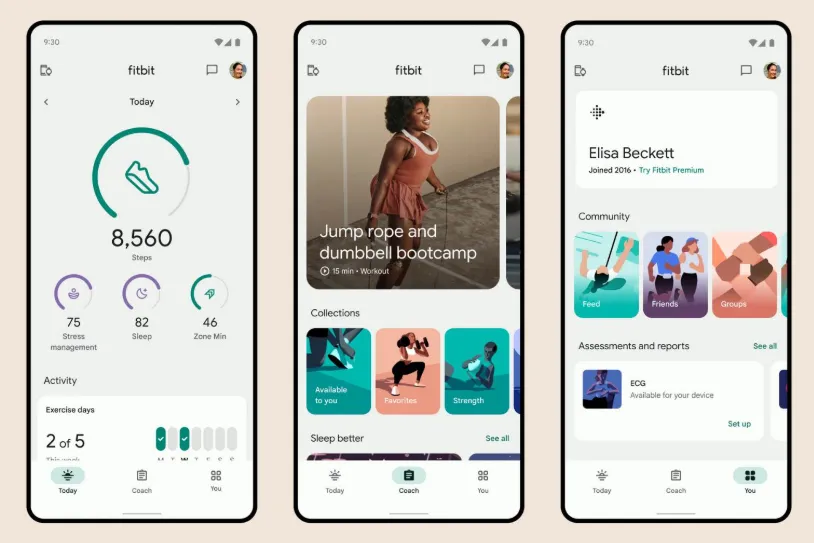
Fitbit tracks fitness, heart rate, and sleep patterns. It syncs with wearables and provides health insights for better lifestyle management.
| Pros | Cons |
| Tracks activity and heart rate | Premium subscription required for insights |
| Sleep monitoring available | Limited free features |
| Syncs with other health apps | Not a medical diagnosis tool |
| User-friendly interface | Requires Fitbit device |
| Encourages healthy habits | Battery life varies |
Want to develop the best online medical app? Contact us to create a seamless healthcare solution!
How to Choose the Right Medical App for Your Needs
You can find an app for anything, from preparing couch potatoes for a 5K to helping you wake up rested. Take caution, though, when using health applications. This holds true for apps on computers, tablets, cell phones, and even televisions. Therefore, use these strategies to sort the good apps from the poor before you start downloading.
1. Have reasonable expectations.
Consider health applications as tools to enhance your offline activities. Therefore, determine what you need to do to reach your health goals before downloading an app. Next, determine what an app can and cannot do to assist. Experts advise experimenting with apps that monitor your behavior and display your improvement over time using charts or graphs. For getting the right assistance and reaching your health objectives, it is best that you can now keep track of your food intake, body measurements, and exercise levels.
2. Specializations and Categories
Healthcare app development comes in a variety of forms and sizes, each designed to meet specific requirements. It is crucial to understand and know the different types of healthcare mobile applications that can easily enable you to understand and target the issue of health you want to tackle. Here are the types of apps you must know:
- Fitness Apps: Fitness apps, the crucial ones, can offer the users different types of workout regimens. This enables the task of goal-setting, step monitoring, and other features for anyone who wants to be healthier. These days, several applications even offer professional teaching for exercises like yoga and focused workouts.
- Nutrition Apps: These applications assist in keeping track of your diet and typically offer detailed information on your caloric and nutritional consumption. A structured diet is essential to any fitness quest. These applications can serve as personalized healthcare apps that include meal plans, food databases, and recipe recommendations.
- Mental Health Apps: Mental health apps are no doubt quite a crucial service for the generation we are in. This is because everyone today does not have the resources or even the desire to get in touch with a therapist for every major or minor setback. These apps can now offers the resources for mood monitoring, stress reduction, meditation, and even online therapy sessions.
- Chronic Apps: Apps designed specifically to help you track and manage symptoms, prescriptions, and visits for long-term or permanent medical disorders are known as chronic condition management apps.
3. Functionality and Features of the App
Let’s examine the features and capabilities provided by a leading healthcare app development business, such as
- Tracking: Apps may provide you with a lot of information, like your vitals, calorie burn, pace, distance run, and food choices.
- Data Analysis: By using data analysis tools, you may compare your current performance to past performance and obtain insights into your progress. This aids in self-improvement and self-challenge or just helps you better understand your biorhythm.
- Compatibility: Although it may seem obvious, be sure the application is compatible with the operating system and device you own. Save time by avoiding looking at healthcare mobile application development services and apps that aren’t even compatible with your specific device.
4. Aspects of Security and Privacy
You give healthcare app development services sensitive personal information that could be exploited against you. Examine every important piece of information provided by the healthcare application development company about
- Data privacy: Industry standards are in place to safeguard a user’s private data. Verify that the business abides by it.
- Security Measures: To protect your account, find out if the healthcare app developers have access controls, secure data storage, and encryptions.
- Privacy: Review the privacy guidelines. This contains details on user rights, limitations, and data handling practices.
5. Models of Cost and Subscription
Health is wealth, but taking care of yourself doesn’t have to cost more than it needs to. When choosing healthcare app development services, take into account the following cost factors. –
Paid Apps vs. Free Apps belong to the following groups.
- Free: There is no charge, however in order to access premium services, payment is frequently necessary.
- One-time purchase: Making a single payment to access the capabilities of the app.
- Subscription Plans: A monthly or annual subscription fee is required to access the app.
Budgetary considerations
Take into account the expenses you may incur over time if you continue to use the app. Keep an eye out for any hidden fees that can turn into actual expenses.
6. Analysis, Suggestions, and Scores
Individuals may have different expectations from a medical app development company.
You might want to compile suggestions from the following sources:
- Healthcare Professionals: You can get guidance on a healthcare mobile app development firm and particular features that fit your wellness objectives from healthcare professionals or experts in the field of your demands.
- Suggested Applications: Examine evaluations and ratings made by previous users as well as reviews from qualified healthcare app developers. You can also search for reliable websites and medical magazines that provide information about healthcare app development.
7. Interface and User Experience
The effectiveness of a healthcare app can be determined by its UI and user experience. Even having a million tools at your disposal won’t assist if you can’t use them or aren’t interested in doing so.
Search for:
- User-Friendly Interface: The application should be simple enough to integrate into your everyday routine. You might not have much time to administer the app on a daily basis, and a laborious process will eventually drain you.
- Preferences: Using an app that you truly appreciate increases its efficacy, according to several users. You can increase your interaction with the app by choosing UX designs, functionality, or visual components that you like.
Future of Telemedicine & Healthcare Apps
There’s no doubt that healthcare apps and the telemedicine sector is experiencing a wave. And there’s no denying that the future holds big surprises with advanced trends and insights. Here are some of the top trends and predictions that are set to transform what the future holds:
1. Combining Machine Learning and AI in Telemedicine
The two prominent technologies, Machine learning (ML) and artificial intelligence (AI) are setting the future of telemedicine. With AI-powered diagnostics, now you can get help in evaluating patient data in real time. Even the doctors can now make better and quick decisions regarding the treatment to be offered. We can take an instance here. AI-powered virtual assistants are a new advancement of telemedicine that can now also automate regular chores. These include patient triage, appointment scheduling, symptom checks, and many more.
With machine learning, now it is easy to process large datasets. This completely allows for personalized treatment regimens and predictive analysis. Moreover, it can enable medical professionals to offer more precise and accurate treatment that can fuel the growth and demand for telemedicine platforms with the power of AI-powered assistants.
2. Wearable technology and remote patient monitoring Medical Technology
Another thing that is going to lead the future of telehealth is wearable health devices These include fitness trackers and smartwatches that are advancing and will continue to do so. Each of these gadgets can help the users to continuously monitor any vital signs like your blood pressure, heart rate, and oxygen saturation. This ultimately gives the medical professionals some sort of critical information for the proactive care management of their patients and especially in the cases of long-term illnesses.
We will see that in 2026, these wearables and telemedicine platforms will now be more advancedly integrated as part of the development of the telemedicine department. When you find anomalous readings, this will lead to enabling automated notifications which also allows the medical professionals to act quickly upon the issues. Now, healthcare practitioners can get the advantage with the ease of remote monitoring by using real-time data for clinical decision-making. This can also lead to better enhancement in patient outcomes.
3. Telemedicine Platform Transformation with 5G Connectivity
With the introduction of 5G networks, now users can easily get quicker networks that will ultimately offer reduced latency that can completely transform the ever-changing trends of telemedicine. With this, the virtual consultations will see a big increase which can resemble in-person meetings. This has to go with the widespread usage of high-definition video consultations and get get the best treatment at the right time.
5G is all set to bridge the gaps that exist among the connectivity in rural areas. These are the areas where the telemedicine adoption often gets hampered by inadequate internet infrastructure. It is now clear that the future of telehealth for those in unreserved communities is set to see improvements by bringing the developments in telemedicine. This will make high-quality healthcare easily accessible to patients in remote locations with now and better 5G connectivity.
4. Increasing Access to Mental Health Services through Telemedicine
2026 is undeniably going to see more improvements in mental health services with the increasing role of telemedicine. Although we know how the telemedicine trends can now indicate that now even more complete mental health solutions are ready to be incorporated into telemedicine platforms. The most common ones today are virtual counseling and therapy which are quite popular today.
Another more understanding approach towards mental health care can be done with numerous features. These include cognitive behavioral therapy modules, self-care tools, and mental health evaluations. Several telemedicine apps are now ready to offer a discreet, practical means of getting assistance, lowering the stigma which is generally associated with mental health services and increasing patient accessibility.
5. Telemedicine Platform for Elder Care and Chronic Illness Treatment
The telemedicine benefits are setting the future of telemedicine, especially for the elderly people or patients who have long-term illnesses. By reducing the need for in-person visits and lowering the risk of infection, telemedicine platforms are now all set to enable virtual consultations, personalized treatment plans, and ongoing, real-time monitoring.
The quality of life of the elderly patients is set to see the improvement by the top telemedicine apps that include numerous features. Some of these include medication management, simple navigation, and user-friendly interfaces. Quoting it all, one of the most smart and progressive developments in the telemedicine sector for senior care is the ability to design a platform which is set to be tailored to fulfill the needs of individual patients.
